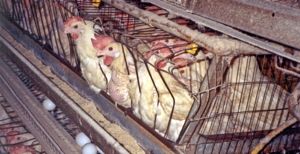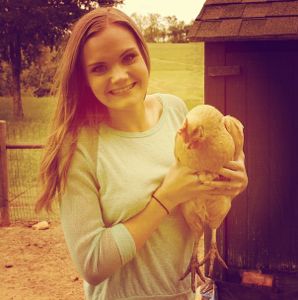March 12, 2014
By Julie Thibodeaux
A campaign led by a student animal advocacy group has prompted the University of North Texas in Denton to announce that it is transitioning to a cage-free egg supplier and is committed to purchasing only cage-free eggs by the end of the year.
"Storing hens in battery cages is not a natural way to produce eggs and the practice is on the way out,” said Bill McNeace, executive director of Dining Services at UNT in a press release last month.
 The change was made in response to a campaign by Mean Greens for Animals, an animal welfare group founded by UNT senior Alexandria Beck, a finalist for the Green Source DFW Sustainable Leadership Awards.
The change was made in response to a campaign by Mean Greens for Animals, an animal welfare group founded by UNT senior Alexandria Beck, a finalist for the Green Source DFW Sustainable Leadership Awards.
Hens peer out of factory farm battery cages, Courtesy of Farm Sanctuary.
“We thought it was an easy way to a make difference for egg laying hens,” said Beck. “It made sense for UNT, which wants to be sustainable.”
According to the Humane Society of the United States, American egg factory farms cram more than 90 percent of the country's 280 million egg-laying hens into battery cages, barren enclosures so small the birds can't spread their wings.
 MGFA gathered 500 signatures from mostly students asking the university to purchase eggs produced under more humane conditions.
MGFA gathered 500 signatures from mostly students asking the university to purchase eggs produced under more humane conditions.
“While the conditions for cage-free eggs is not ideal, it’s great to do the switch,” said Beck. “A battery-cage boycott is a big move in the right direction for animals, workers and public health.
Many animal advocates point out that birds at cage-free factory farms still typically live in crowded, windowless warehouses. However, Beck said this is a good first step for the university, which already operates the first all-vegan dining hall in the country.
According to Ken Botts, special projects director for UNT Dining Services, the cost difference will not be significant to go to cage-free suppliers, with student meal plans going up by only $10 per semester as a result.
A number of major companies have switched to cage-free eggs, including Kraft Foods, Sara Lee, General Mills, along with fast-food restaurants like Wendy’s and Sonic Drive-In. According to the Sustainable Endowments Institute, 64 percent of universities are using cage-free eggs, including UCLA, Harvard and Princeton.
Ethan Dussault, Texas State Director of The Humane League, which advised MGFA, said UNT students should be proud of the accomplishment.
“A university of this size making the switch will have a significant impact on tens of thousands of hens over the coming years."
Julie Thibodeaux is the Managing Editor for Green Source DFW. Previously, she worked as an editor and writer at the Fort Worth Star-Telegram. Contact her at Julie@greensourcedfw.org.
Sign up for the weekly Green Source DFW Newsletter to stay up to date on everything green in North Texas, the latest news and events.









